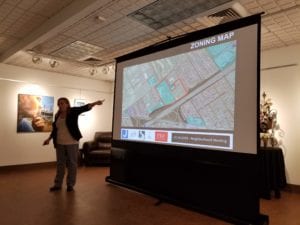
Kelli Jones describes a zoning map of The J campus during a Nov. 14 public meeting. (Community photo by Lisa Hornung)
City permit permitting, the groundbreaking for the campus of the future J could be just a few months off.
That was the big news that came out of a Nov. 14 public meeting for neighbors of the campus, construction on which is slated to begin by early spring.
Work on the campus – parking, drainage, landscaping, outdoor facilities – is separate from the building itself.
The meeting complied with city rules to obtain a conditional use permit, which is required to begin construction. The site is zoned residential and office residential, so the permit is needed to build parking and camp structures there
If the Board of Zoning Adjustment approves the permit by February, construction could begin in March.
There are more steps before groundbreaking can take place, so the timeline could still change.
Kelli Jones, of architectural firm Sabak, Wilson and Lingo, which was hired to design the new campus, outlined The J’s proposed campus for the neighbors, detailing the positioning of various structures on the property, including roads, pools, buildings and parking lots.
She also showed her audience how the project would be environmentally friendly, adding a detention basin behind the building and a “bioswale” (channel) in the new parking lot to clean and reroute stormwater runoff.
The design phase is still going on, so changes to the plans are still possible.
“We don’t have finished construction plans,” said Jewish Community of Louisville Board Chair Jon Fleischaker.
Among the neighbors’ questions was what would happen to the two houses formerly owned by Anshei Sfard. JCL President and CEO Sara Klein Wagner said they will eventually be demolished and replaced by green space.
Wagner also said the Anshei Sfard building will continue to be used for Camp J and other J programming, at least through next summer. Beyond that, there are no plans yet for the facility.
Other neighbors inquired about a possible barrier at the back of the property between the surrounding neighborhood and the campus. Jones said a screen of trees, bushes or other vegetation would be planted.
Wagner said she appreciated the neighbors’ interest in the project.
“We’ve been here for over 60 years,” she said. “The people who live in the neighborhood have been part of our extended family. I would not be surprised that they have questions about what’s happening next door.
“We certainly want our neighbors, above all else, to be comfortable and know what’s going on.”
Fleischaker said the neighbors are entitled to answers about the project.
“This is just another step,” he said. “We are definitely moving, and it’s moving forward, and it’s going to continue to move forward.”


